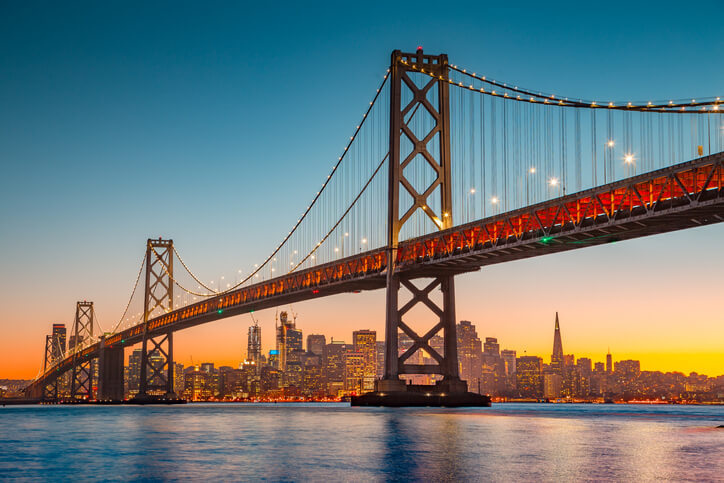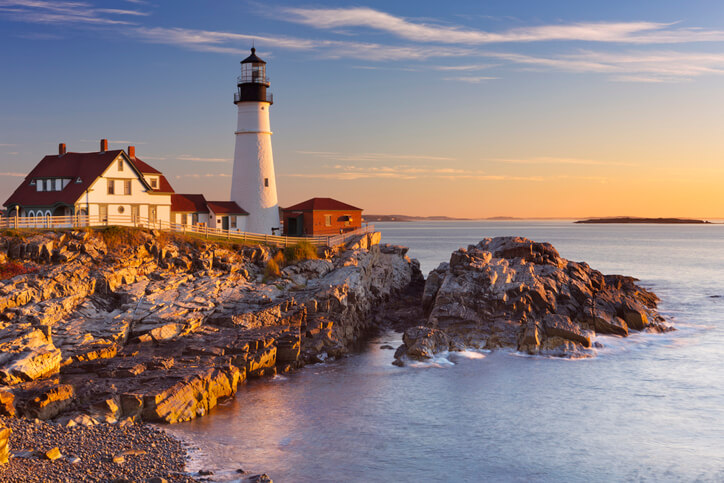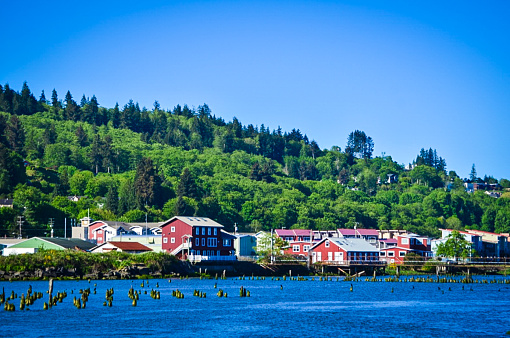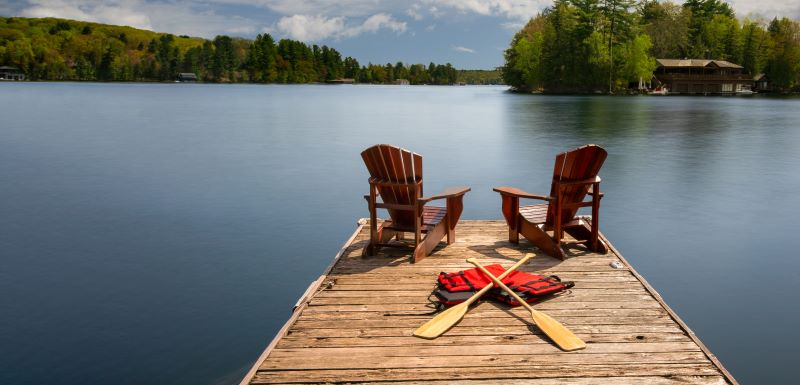Key Takeaways
- Choosing where to spend retirement is about more than finding a warm climate or a lower cost of living. It’s about matching your surroundings with the life you want to create. The right city can offer connection, support and opportunities that make every day more fulfilling.
- For some, that means living near theaters, galleries and historic neighborhoods. For others, it’s easy access to the beach, mountains or trails. You might value excellent health care, preserving personal finances or the comfort of a smaller town with a strong sense of community.
- We’ve highlighted 27 cities across the country that appeal to a wide range of interests. Each one has its own mix of culture, resources and character that can help shape your next chapter.
Best Cities for Retirees Who Love Arts and Culture

1. San Francisco, California
San Francisco, California is a top retirement choice for culture lovers thanks to its historic landmarks, diverse communities and access to excellent health care.
The Golden City offers mild weather year-round and a cultural scene shaped by history and innovation. Retirees can explore museums, theaters and historic districts while also benefiting from leading hospitals and wellness resources. California’s exemption on Social Security taxes adds another layer of appeal.
Notable stops include Fort Point at the base of the Golden Gate Bridge, Mission Dolores dating back to 1776 and the Cable Car Museum. Even a casual night out connects you with history at Old Ship Saloon, which still operates on the site of a Gold Rush shipwreck.
2. New Haven, Connecticut
New Haven is a city where culture is part of everyday life. Walk downtown and you’ll pass historic architecture, theaters and music spilling out into the public green. Each summer, the International Festival of Arts and Ideas brings performances and discussions that draw people from across the region.
The influence of Yale University adds to the mix with galleries, lectures and concerts that are open to the wider public. There are also parks like East Rock that offer trails and views, and the shoreline is just minutes away. For venturing past city limits, you can get to New York and Boston on a quick train ride, but you don’t need to leave town to find variety and fun.
3. Savannah, Georgia
Savannah is known for its charm – from pastel buildings and cobblestone streets to quiet squares shaded by live oaks. The city feels like a gallery where history and design are part of the scenery.
You can spend a morning walking past stately homes with wrought-iron balconies then relax in a park surrounded by fountains and moss-draped trees. Along the Savannah River, old warehouses have been turned into shops, inns and restaurants, giving the waterfront new life while preserving its past.
For a change of pace, Tybee Island is a short drive away with wide beaches and sand dunes that offer a calm escape. Savannah’s blend of historic neighborhoods, coastal landscapes and cultural beauty makes it a city where everyday life feels like an experience.
4. Lancaster, Pennsylvania
Lancaster may be small, but it carries more variety than you might expect. Surrounded by rolling farmland, the city itself is compact and walkable, with historic streets, coffee shops and galleries that give it an easy sense of place.
At the heart of it all is Lancaster Central Market, in operation since the 18th century. It’s the kind of spot where you can pick up fresh produce, flowers or baked goods while talking with local vendors who have been part of the community for generations.
If you’re used to the pace of Philadelphia, New York or Washington, Lancaster feels like a genuine change without putting you too far away. It offers room to breathe while keeping you close to more active areas, which is part of what makes it so appealing for retirement.
Best Cities To Retire for a Coastal Lifestyle

5. Miami, Florida
Miami brings a coastal lifestyle that feels like summer all year. Even in the middle of winter, temperatures stay warm enough to spend your days outdoors.
The beaches are the city’s biggest draw, and life here tends to spill outside whenever it can with art shows, yoga classes and concerts that often take place under the open sky. Many restaurants take advantage of the setting too, giving you the option to enjoy a meal while looking out over the water.
For those planning retirement, Miami offers more than scenery. The city has a wide network of medical centers, a strong retiree community and an international airport that makes it easy to stay connected with family and friends. Florida’s lack of a state income tax also means more of your retirement savings stay in your pocket.
6. Sarasota, Florida
Sarasota often earns a spot on lists of the top 10 best cities to retire in the US, and it’s easy to see why. The city’s Gulf Coast beaches feel far less crowded than those in Miami, giving you a chance to enjoy the water at a slower pace.
Beyond the shoreline, Sarasota has a reputation for its arts scene. Theaters, galleries and live music venues bring a level of culture that might surprise visitors expecting only sand and sun. The Ringling complex, with its museum and performing arts spaces, adds to the ever-growing creative scene.
For retirement living, Sarasota blends small-city convenience with Florida’s well-known tax benefits. With its moderate size, you can get around easily while still having access to quality health care and services geared towards older adults.
7. Astoria, Oregon
Astoria sits at the mouth of the Columbia River, where history and scenery come together in a town that still feels distinctly Pacific Northwest. It was the first permanent American settlement on the West Coast, and reminders of that past are visible in landmarks like the Astoria Column and the city’s historic downtown.
Life here moves at an easy pace. You might spend the morning exploring shops downtown, take in sweeping river views in the afternoon or ride the vintage trolley that runs along the waterfront. When the cruise ships leave, what’s left is a small city with character, shaped more by its residents than by visitors passing through.
Astoria makes daily life simple with reliable bus service and ride-shares, plus easy access to coastal trails, parks and seafood markets. It’s a practical base for retirement planning that doesn’t give up character. It’s the kind of place worth considering as you map out your options and work through a retirement planning checklist.
8. Baton Rouge, Louisiana
Baton Rouge gives you the perks of Louisiana living without the high price tag found in bigger Southern cities. Winters stay mild, so it’s easy to stay active outdoors, and the city’s location on the Mississippi River creates opportunity to spend time on the water.
The area is also rich in history. From the Old State Capitol to the city’s many museums, you can dig into local culture while still enjoying the relaxed pace of a mid-sized city. Add in the food scene—Cajun and Creole flavors are everywhere—and everyday life here comes with plenty of character.
For retirement, affordability is a real advantage. Louisiana doesn’t tax Social Security, home prices are below the national average and most other retirement income is treated more lightly here than in many states. Monthly expenses are lower and health care access is solid too, with several major hospitals and medical centers based in the city.
9. Portland, Maine
Retirement in Portland means living where the coast meets New England’s character. The harbor is still a working port, so instead of feeling like a resort town, the city has an everyday rhythm that makes it livable in every season. The seasons here shift constantly, bringing island ferries and farmers’ markets in summer, fall colors across the countryside, winter skiing and snowy coastal walks, then spring seafood festivals as the harbor wakes back up.
Portland is home to Maine Medical Center and several other hospitals, giving you a high level of care without needing to travel to Boston. Daily needs are within a short walk or drive, and the city’s airport adds convenience for longer trips.
Best Cities To Retire in the US for Urban Adventures

10. St. Louis, Missouri
St. Louis is a city where history, culture and affordability meet in a way that’s hard to ignore. Baseball at Busch Stadium, blues clubs on South Broadway and neighborhood diners serving up toasted ravioli give it a flavor all its own.
Forest Park anchors the city with more than a thousand acres of green space and cultural institutions that are free to explore, including the zoo, art museum and history museum. The park also offers golf courses, gardens, boating in the lakes, and more than 30 miles of trails. Seasonal concerts and festivals bring people together, while the Jewel Box glass conservatory gives you a quieter way to enjoy your golden years.
What makes St. Louis one of the best cities to retire in the US is how each neighborhood carries its own character, from Italian trattorias to historic farmers’ markets. Simply hop on the MetroLink from downtown to the Loop and you’ll pass through many different sides of the Gateway City that invite you to get off and explore.
11. Austin, Texas
Austin has earned its reputation as a city where live music, outdoor living and a thriving retirement community come together. The population has surged in recent years, and retirees have been a major part of that growth.
With temperatures that average close to 80 degrees, outdoor life here isn’t seasonal, it’s constant. The Hike and Bike Trail offers miles of paths for runners and walkers, while Lady Bird Lake attracts kayakers, paddleboarders and rowers looking to spend time on the water. The city’s Parks and Recreation Department also runs programs designed for adults over 50, making it easy to stay active and meet people.
The city calls itself the “Live Music Capital of the World,” and venues across town prove it with performances every night. SXSW takes over each March, bringing in thousands of performers from around the globe. But even outside festival season, you can catch live blues, country, rock and indie shows without much planning.
12. Cincinnati, Ohio
Cincinnati works well if you want a city that keeps you busy but still feels approachable. The airport connects you quickly to Chicago, Nashville and other regional hubs, and the Ohio River Scenic Byway lets you take road trips through small towns and rolling farmland without needing much planning.
Closer to home, Over-the-Rhine blends 19th-century architecture with one of the country’s oldest public markets where local vendors have been serving residents since the 1850s. The downtown riverfront has trails, parks and ballgames at Great American Ball Park, all within walking distance on mostly flat terrain.
For retirees, the appeal is variety. You can spend a Saturday exploring museums and galleries, join a walking club that meets along the waterfront or catch a concert at one of the city’s restored theaters. If your top priority is staying active and engaged, Cincinnati meets and exceeds that criteria.
13. Orlando, Florida
Orlando means you’ll never have to bribe the grandkids to visit. With Orlando International Airport, Walt Disney World, Universal Studios and countless other attractions nearby, your home becomes the launching point for family trips that don’t require much convincing. The theme parks draw millions every year, but living here means you get to enjoy Central Florida’s warm weather and growing arts scene without fighting the tourist crowds every day.
Orlando has neighborhoods that fit different retirement styles. Some areas stay walkable with shops and restaurants clustered together, while others offer quieter residential streets with more space. The South Orange neighborhood sits near Orlando Health and other medical facilities, which can matter more as the years go on.
For retirees who want warmth, accessibility and built-in entertainment for visiting family, Orlando consistently appears on lists of the best cities to retire in the US without requiring you to live at a theme park’s doorstep.
Best US Cities To Retire in if You Love Winter

14. Centennial, Wyoming
For skiers who’d rather spend retirement on the mountain than thinking about taxes, Centennial delivers on both fronts. Wyoming doesn’t tax income, pensions or Social Security benefits and the Snowy Range Ski Area offers downhill runs without the crowds or price tags that come with resort towns in Colorado and Utah.
The town itself has fewer than 300 people, which means the Snow Range Ski Club feels like skiing with friends rather than strangers. The mountain runs events throughout the season, with clinics for skiers over 60, themed days like Bacon Day and an Old Ticket Day where they’ll honor whatever old passes you’ve been carrying around. It’s low-key in the best way.
Medicine Bow-Routt National Forest surrounds the area with trails and fishing spots for when you want a quieter day. Centennial works if you want winter to be something you lean into rather than tolerate, and if a small mountain community with natural beauty sounds better than a busy ski resort.
15. Colorado Springs, Colorado
Colorado Springs gets over 60 inches of snow each year, enough to make winter feel real without leaving you snowed-in for days. Pikes Peak rises above town blanketed in white, and sunny days between storms mean you can get outside for cross-country skiing or snowshoeing without battling constant whiteouts.
The community here skews older and more established than typical ski towns. You’re not surrounded by 20-somethings working seasonal jobs. You’re living among people who chose this area for the long term. That means better medical infrastructure, less turnover in local businesses and neighbors who remember your name.
What makes it work for an active retirement is that the low cost of living keeps things reasonable compared to resort towns an hour west, which matters when you’re on a fixed income and want your money going toward experiences instead of rent.
16. Minneapolis/St. Paul, Minnesota
Minneapolis and St. Paul embrace winter instead of hiding from it. The cities maintain over 100 miles of plowed trails for walking and biking even when snow piles up, and the Skyway system in downtown Minneapolis connects 80 blocks of buildings through enclosed second-floor walkways.
The Twin Cities also run one of the most extensive public transit systems in the region. Metro Transit operates buses and light rail that keep running through snowstorms, so you can ditch your car without sacrificing mobility. Neighborhoods like Uptown, Northeast Minneapolis and Cathedral Hill in St. Paul put restaurants, shops and cultural venues within walking distance, even in January.
Best Cities for Retirement if You Like Warmth and Sunshine

17. Scottsdale, Arizona
Scottsdale has built its reputation around two things: golf and sunshine. The city has nearly 200 days of clear skies each year and close to 70 golf courses spread across the valley. If you’ve spent decades dreaming about retiring somewhere you can play year-round, this is that place.
The city also has more spas per capita than anywhere else in the country, and senior centers like Granite Reef and Via Linda offer art classes, fitness programs and social events designed for older adults. The arts scene is eclectic, with galleries throughout the downtown arts district and the Scottsdale Museum of Contemporary Art adding color to the cultural side of things.
Arizona doesn’t tax Social Security benefits, which helps stretch retirement income further. The cost of living runs higher than other parts of the state, but the tradeoff comes in access to top-tier medical facilities and a community where retirees aren’t the exception.
18. Yuma, Arizona
Yuma holds the Guinness World Record as the sunniest city on Earth, with clear skies 91 percent of the year. January temperatures hit the upper 60s, so outdoor activities continue year-round. Summer heat regularly tops 100 degrees, but for people who prefer heat over cold, it’s a worthwhile trade.
The city has 34 public parks, four public pools and a riverfront path along the Colorado River that works for walking or biking. Yuma attracts snowbirds who want consistent weather without paying Scottsdale prices. The cost of living stays lower, and the slower pace appeals to people looking for warmth and simplicity over nightlife and crowds.
Yuma works if sunshine matters more to you than variety, and if you’re fine trading cultural amenities for reliable weather and lower housing costs.
Best Retirement Cities With Small-Town Charm

19. Madison, Indiana
Madison sits along the Ohio River with a downtown preserved as one of the largest National Historic Landmark Districts in the country. Brick storefronts and 19th-century architecture line the streets, and the town keeps a slower pace most of the year. Summer brings the Madison Regatta, when hydroplane boats turn the waterfront into a spectator event that draws regional crowds.
The town works as a base for exploring southern Indiana’s parks, wineries and scenic byways, with enough happening locally to keep you occupied. The riverfront park, antique shops and house museums are some of the best places to wander close to home. Madison also runs a volunteer program matching retirees with local nonprofits, making it easier to get involved in the community.
20. San Luis Obispo, California
San Luis Obispo, referred to as “SLO” by the locals, sits halfway between Los Angeles and San Francisco on California’s Central Coast, where the mountains meet the ocean. Cal Poly gives the town a college energy without the overwhelming crowds, and that mix keeps local restaurants, theaters and shops active throughout the year. The downtown stays walkable, with most of what you need within a few blocks of each other.
The farmers market takes over downtown every Thursday night and has become one of the largest in the western United States. You’ll find fresh produce, prepared foods and live music spilling into the streets, turning a routine errand into something more social. SLO also gets sunshine about 300 days a year, with February temperatures that can reach 80 degrees. If you’re tired of winter, the climate here eliminates it almost entirely, all while keeping you close to hiking trails, beaches and California’s wine country.
21. St. Charles, Missouri
St. Charles has kept its historic character intact while staying close enough to St. Louis that you’re not cut off from anything important. The downtown feels like it belongs to locals rather than tourists, with independently owned cafes and antique shops lining Main Street. You can walk to dinner, spend Saturday mornings at the farmers market and know your neighbors by name within a few months of moving in.
The Katy Trail runs right through town, which means you can step out your door and onto one of the longest converted rail trails in the country. Wine country sits a short drive west for when you want a change of scenery. St. Charles offers the kind of small-town rhythm where life slows down without getting boring, and you’re still close enough to a major city that nothing feels out of reach.
22. Natchez, Mississippi
Natchez feels like stepping into a different era, where front porches are made for sitting and conversations with neighbors happen naturally. The town sits on a bluff overlooking the Mississippi River, and the historic district is filled with homes and gardens that have been maintained for generations. You can walk through neighborhoods where every block tells a story, and the pace of life reflects that sense of permanence.
Mississippi doesn’t tax Social Security or retirement distributions, and the cost of living stays low enough that you can afford a home with character. Local restaurants serve Southern cooking without the tourist markup, while the community gathers for festivals and live music that feel genuine.
Best Cities for Retirement Based on Access to Resources

23. Providence, Rhode Island
Providence concentrates medical care, public transit and cultural resources in a way that makes daily life manageable as you age. Rhode Island Hospital and Miriam Hospital anchor a strong healthcare network, and the train station connects you to Boston’s specialized medical centers in under an hour. RIPTA buses run throughout the city, and Brown University opens many of its lectures and events to the public. Libraries, senior centers and community programs receive solid funding, which means support services stay accessible when you need them.
24. Cambridge, Massachusetts
Cambridge gives you Massachusetts General Hospital and Brigham Women’s Hospital practically on your doorstep, which counts for a lot as healthcare becomes more important. Harvard and MIT mean you can attend lectures, use libraries and visit museums without enrolling or paying membership fees. The Red Line keeps you connected to the rest of Boston, and neighborhoods here cluster pharmacies, doctors’ offices and grocery stores together so errands don’t eat up your day. The city has built itself around people who walk or take transit – a setup that works well when driving starts feeling like a burden.
Honorable Mentions: Best Cities for Music, Golf and Dogs
25. Nashville, Tennessee (Music)
Nashville lives up to its Music City nickname every day. Walk through downtown and you’ll find live music spilling out of honky-tonks and venues that don’t charge a cover. Locals know where to find blues, rock shows and singer-songwriters testing new material in quiet listening rooms. You can catch a different genre every night without repeating yourself.
The city throws free music festivals for July 4th and New Year’s Eve, with fireworks and big-name acts drawing crowds to the riverfront. Smaller festivals happen year-round and venues book talent constantly. For retirees who want music woven into daily life, Nashville makes it easy to stay immersed without spending a fortune on tickets.
26. St. George, Utah (Golf)
St. George sits in Utah’s southwest corner with a climate that lets you golf year-round against red rock landscapes. The city has 10 courses within a ten-mile radius, forming the Red Rock Golf Trail. Options range from affordable municipal courses to championship layouts, with tournaments running throughout the year.
The city’s golf loyalty program rewards frequent players with reduced tee times, pro shop discounts and a free round after every 20 played. St. George offers lower healthcare costs and less congestion than Florida golf destinations. If golf drives your retirement plans and you’d rather play in desert sunshine than humid heat, St. George delivers.
27. Richmond, Virginia (Dogs)
Richmond has built itself into one of the most dog-friendly cities in the country. The Richmond Flying Squirrels host Bark in the Park nights during baseball season, Woofstock brings together hundreds of dogs and owners for a one mile walk and vendor booths and the Dominion Riverrock festival includes canine dock jumping competitions.
Farmers’ markets welcome dogs and feature vendors selling dog products, while Carytown’s shops and restaurants let well-behaved dogs inside. Water bowls sit outside most storefronts citywide. The Richmond SPCA runs an indoor training facility with classes covering basic obedience to agility courses, plus a School for Dogs program offering twice-weekly drop-offs for training and socialization. For retirees whose dogs factor into every decision, Richmond accommodates that lifestyle completely.

Want to keep exploring? Check out our top snowbird destinations!
Will One of These Best Retirement Cities Be Your New Home?
Reading through the best cities to retire in America isn’t just about matching a place to your favorite hobby. It’s about discovering where you can live the life you’ve been planning for, whether that means access to world-class healthcare, a bustling arts scene or simply a town where neighbors know your name. Now that you have the flexibility to choose where you settle, take advantage of it.
Keep an open mind as you explore your options and talk through priorities with your partner if you’re making this decision together. The challenges of choosing where to retire are real, but so are the rewards of finding a place that feels right. Take time to identify what matters most and set aside the worry of trying to find a perfect match.






I have traveled the last 7 yrs by car bus railroad and foot and not found some place where I was welcomed I am a senior of independent means small as they are looking for a small walkable town with mtn or hills creeks and rivers affordable housing and non judgemental people I know needle in a haystack lol I keep searching 😂😆
Such a nice calm relaxing blog
St. George, Utah is “less crowded” than Orlando? You have not been to St. George lately. The traffic here now is insane. So many Californians have poured into the area since the pandemic. They want outdoors, open schools and services, etc. St. George was so not ready for this influx. You go to the grocery stores and the stock is depleted. We have had a 2nd home here since 2005 – hoped to retire here – but so crowded now looking elsewhere.
As a person currently residing in Austin, I can definitely not recommend it for retirement for the following reasons.
Housing is really expensive.
Property Taxes are excessive: almost $9000 per year on a house valued under $400K.
Very bad traffic.
Homeless camps under most overpasses, and very aggressive panhandling.
Expensive water.
A lot of the artists and musicians who made Austin cool are having to leave because they can no longer afford to live here.
For people who are seeking a warmer weather and a laid back lifestyle Texas is the ideal destination. Texas has the most affordable hosing, lower tax rates, and ample of leisure activities. Along, with that cities like Sugar Land offers both business as well as job opportunities for retirees looking to launch a second career. Along, with that the state also houses some of the best hospitals and doctors, which can help you manage your health condition and that too at an affordable rate.
Does not say weather averages.
Great list, a lot of good research went into this and gives a great list of places to visit.
I love Venice, Fl. It’s on the gulf coast (I don’t buy into the rising ocean fears), offers great food, great fishing, great cycling and kayaking, and is very safe. Plus the weather is outstanding.
Thanks for the update, how can I make is so that I get an email whenever you write a fresh update?
Good information…I’ve lived in two of the 50 for 50yrs (25 Nashville and 25 Cincinnati). Looking to retire in two and trying to decide which one. Keep it coming.
Well, I discovered a gem called PR. It’s a US colony, good internet, roads, medical service, plenty of hiking, beaches, excellent food . If you find a place in the country side you will get a bargain. Please don’t tell anyone this secret.
Loved reading all the info based on personal likes. Also enjoyed reading reviews. We (husband and I) live in the Deep South and have all our lives. I would like to find someplace that is esthetically neat,clean and beautiful. A mid size city with lots of outdoor opportunities like walking and easy hiking. Good health care and access to musical activities. Affordable too. We are both 78 years old but in fairly good health working out at our local gym and doing water aerobics. We enjoy “al fresco” dining and a little feel of Europe. Four seasons with no extremes. I know there are places out there,just don’t know where. Thanks for your input.
How about wanting to live in a mid sized city, with restaurants, culture, walk ability and universities nearby? Let’s not forget having an airport close by, with Amtrack service and plenty of local transit also? YES: I want it all!!!
Looking for warm weather, no winter weather. Affordable housing, no tax on social security, low crime rate, diversity. I’m 64, I’ll be 65 in March. Will retire at 66&4 months. Have not been able to save much. Got in some debt in the last 3 yrs when I had to raise my grandkids. Consider moving to North Carolina, but the hurricane season concerns me, also Nevada. Thinking of transferring until retirement. I work for The Internal Revenue Service. Has to be a city with IRS campus. Have 25 yrs of service, although I had some breaks in between. What do you suggest for me? What are my options? I have been doing my research, still trying to make a right decision. Live in Kansas City Missouri, although I have lived in other states. I miss California, but too high in cost of living. Have arthritis, which is bad in the winter. Tired of the cold weather.
You chose Indianapolis for the Foodie scene by naming Michael Symon’s B-Spot burger joints. Michael Symon’s restaurant empire is headquartered in Cleveland Ohio!! You don’t list Cleveland or Columbus or Dayton!! The best Heart Hospital is the Cleveland Clinic!!
A great read full of info! How about less expensive yet with in reach to be able to live comfortably yet have many of these options! I’m 60 and looking to relocate maybe open a little shop and plan on retirement g there slowly!
I’m interested more in the state of Washington for retirement. Any suggestions on Washington?
How about Monroe Township, New Jersey?
It truly annoys me that AARP assumes that we are all retiring with great assets and no financial considerations to take into account. How about including information about cost of living prices in your article’s list of cities???
I lost most of my retirement income from a corrupt Bond scam in 2003. Oh well. So, what if you are dirt poor, living on social security and can’t afford rent in the place you have lived for the past 15 years.
Myrtle Beach should have made the list. Get around on a golf cart, low SC taxes, known for golf, fishing and beautiful beaches. Very inexpensive to live, easy to fly in and out of, food versatility, family fun and temperatures that are nice all year with warm ocean temperatures. Very nice people from around the country and plenty of retirement communities. A lot more, but I think you get the idea, most retirees come and stay here happily.
This list is a bit bizarre and I suspect it was written by someone younger than 40. I have been to and/or lived in many of these places. Very few of them offer more than a unidimensional aspect for a retired person- What I need/want is 1) Affordable in retirement (in many of these places’ living cost a fortune!) 2) friendly to people with disabilities 3) welcoming of diverse political/ social/views 4) home to excellent health care for ELDERS ( a VERY different population for health care than other age groups) 5) appropriate weather year round 6) social, intellectual, and community support for elders. I will stay where I am in affordable northern New England and rent for 3 months in the winter in a warm place for as long as I can.
After 24 years retired in Myrtle Beach South Carolina, don’t know why someone would go any where else. We have it all!!
My plan is in Albuquerque NM. Been there the weather is great, change of seasons, but not 6 months of winter like Chicago. Cost of living is lower and they seem to have everything we are looking for.
After 24.7 years in the US Air Force in 1976, visited 40 different states, eighteen years stationed overseas, we selected Panama City Florida, worked another 24 years at WJHG TV. Cancer, Myeloma in 2009, survived Hurricane Michael, now 84 years old, very weak legs, tired all the time, still married 64 years. As my health has became a concerned, have decided to move to Fort Walton Florida area at Military Bob Hope Village, three miles from Elgin AFB, new handicap apartment which will meet my requirements for my remaining years, only 60 miles from Panama City. Advise everyone to review not what you want, but the best location for you and your spouse to live at for you remaining years. Before I retired from the AF in 1975, Tucson AZ was also top of my list. If work is one of your priorities it should be moved to first unless you are very near retirement.
Williamsburg, VA is the perfect retirement spot. The college of William and Mary offers outstanding learning and cultural opportunities, and colonial Williamsburg is an American history lover’s dream come true. There is a lot of cultural offerings here. The weather is lovely all year long with seasonal changes, but never very cold. There is outstanding heath care here too.
I will stay in NEW YORK CITY….. It has all of the above!
Being a retired married man Living In Harbor Springs, Michigan is the best place on this earth to live happyily. Amen. That says it all.
Wesley, thanks for sharing this!
Seems like affordability information is missing for the options listed. The older you get the important items list changes. Health care certainly moves up the list. Family is a factor also. Articles like this are interesting but of limited value when making such an important decision.
I presently live in Panama City Florida, a location we decided on after 24.7 years in the Air Force, in 1975. Worked another 24 years at WJHG TV, Cancer 2009, Myeloma, still happy in Panama city, did okay during Hurricane Micheal
Thank you!
I love New Mexico but do not know if it would be good for a single woman. I would like to get involved helping somehow and/or be involved in meditation. You can feel the Infinite there. What kind of help do the Indians welcome—if they do.
Since I am a single senior, I also think being in places like South Florida where you are right in the middle of people, shopping and the ocean would be good and important. I lived in Miami years ago; however, now they have those snakes and I am not a fan of that.
How about someplace where housing costs won’t rapidly erode your nest-egg? We are in our 70s and would prefer apartment living at this point. Our combined social security benefit is ~$2400 per month and we would prefer not to spend more than half of that for rent and utilities.
Most of the places you list have housing costs that far exceed that. I agree with the comment that says the best place is where you are now!
Fairhope, Alabama population 20,000.
Moderate Winter & Hot Summers
On the Mobile Bay. Haven for Writers & Artists. Very diverse population
Close to Gulfshore Beaches, and New Orleans. Biloxi, Mississippi for Gamblers. Pensacola for Airport & Blue Angel’s. Plenty of goling opportunities. Reasonable housing prices. Deep Sea Fishing available too. Deep Southern Hospitality.
Nice places mention.. I live in NY & I’m tired of the winters! I love freshwater fishing in the warm weather. Would like to find a place where I could winter & fish. Any suggestion would be helpful😎
We retired to Prescott, AZ, and were very happy there for over 13 years. There is much to do there, hiking, biking, lifelong learning. Really something for everyone. With much cooler temperatures than Phoenix. My wife’s asthma and COPD started making it very hard to breathe at that elevation. Last fall we moved to Oak Harbor, WA. Here we are in the rain shadow of the Olympic Peninsula, getting about half as much rain as cities in every direction. And again we are in a place where there is a lot to do, including hiking, biking, kayaking, enjoying the forest, and much more. We are both happy with the change.
Norm, we are happy to hear you are loving your new home! Thanks for sharing.
When compiling this list was cost of living considered? San Francisco is truly one of the nations treasures but the cost of living is astronomical! I see there are 2 MN cities on the list both great for winter lovers but keep in mind that the state of MN taxes social security benefits. I recommend researching what’s important to you, for example many cities would be eliminated due to lack of quality medical care & high crime rates. I’ve lived in several of these cities due to job transfers & wouldn’t consider any of them a perfect retirement spot unless you have unlimited funds, but you have to prioritize what’s right for your financial situation.
Weather is only one factor. Access to good health care is very important. You need to be near family. Old friends are better than new friends. Whoever put Yuma, Arizona on this list must have a great sense of humor.
I am considering a nomad lifestyle, and I would love to visit a lot of these places. I’d love to see an article with pro’s and con’s of RV life as a retirement option.
Hi Katherine- stay tuned, we are creating an article as we speak! In the meantime, you can read our other RV article here.
A retirement city should have the following: nice inexpensive restaurants, golf courses, spas, pools and a moderate climate with a little diversity of season. It needs very good doctors and hospitals for heart, lung vascular & diabetic patients. Also, good caregivers who can afford to live in the area. Then it should also have highly rated nursing homes with inexpensive access. Then last but not least access to Neptune Society or funeral arrangements. A good retirement city would fulfill all of the needs of seniors form 70 to 100 + because this is what’s coming. We should also look at all of the people that are going to provide all of those services for our hard earned dollars that we will be paying them for as we get to our final destination. That is what retirement should look like for us. It is not just party time as you age. And access to easy transportation because driving is not always an option.
Thanx for the options. I am surprised some Washington state locations are not included – ocean, mountains, four seasons or not depending on which side of the mountains you select, all parts of the U.S. represented (except swamps). But then this why we came back. And you don’t have to change your currency into wampum – the wild West is gone. The down side – we don’t tan we rust!
I am retired and live in a retirement community called Bristol Village in Waverly, OH. It is a very active community. I have lived here for 20 years. It is an hour’s drive from Columbus, OH. 30 miles south is Shawnee State College with many excellent professional shows every year. We have about 300 individual houses plus apartments and health care facility on campus. We are within 15 miles of convenient shopping and good hospitals and medical care. We have a large Krogers store within one mile and a Wal-Mart within 4 miles. We have many good churches nearby. This is definitely the right place to retire.
Gareth- thanks for sharing!
I would like to see an article on places with the mildest weather and less chances of natural disasters.
As a widow in my late 70’s, I am looking to leave my home in So Cal because of high taxes and, to me, an unfavorable political situation in my state. I plan to join family in WA state for most of the year. I’ll run back to the desert for a few weeks when it get’s too rainy up there!!
Hi Anne, congratulations on your move up north. Enjoy your new community!
Thank you for your comments. I’m a 80 year old, very active, women looking for a place to move to, out of central Ca. but I haven’t made up my mind yet. Ca., weather has become too hot and it is also too expensive, I’ve been looking at the Willamette River area in Oregon, I noticed you mentioned Salem, Oregon. I would like a small town with lots of outdoor activities, reasonable home prices and centrally located between my three sons, that are in WA. OR. and CA.. I noticed that you didn’t mention much about needing family help at times. Which should be considered.
Also would you do an article on moving, hiring a moving company, packing up what you want to keep, and selling what you or your children don’t want. After living in one house for 40 years, my husband passing away, the accumulation is unbelievable.
The new tax laws make it unprofitable to donate to charity anymore. Since I have to pay taxes, I needed that deduction.
Interesting that you only mention 2 places that won’t tax your pension or SSA. Google because there are 12 total. Nevada not even mentioned and it has no state income tax. I will stay where I am thank you.
I’m amazed that you didn’t include the Palm Springs region. It’s going like crazy and world renown for the many beautiful golf courses, restaurants, and entertainment. The weather is absolutely incredible. That’s why the population doubles, sometimes triple when the snowbirds come. And the face we have Coachella, The Dinah Shore women’s golf tournament, Indian Wells is known for the Masters Tennis Tournament, Stagecoach, etc. I could go on. Wow, that was a major overcite, at least I think so. There are so many retirees’s already living here year round as well.
Dave
Sometimes staying put is the vey best option. Many times folks who pull up stakes and move when they retire forget how important community ties are in one’s life. Are you involved in art/music/educational projects of long standing? Do you have friendships built through community experiences over the years? Sometimes starting over with those aspects of your life becomes a daunting task. Building those relationships at 40 or 50 is a whole different expenditure of energy than it is 60 or 70
Just wondering how many retirees could afford San Francisco. Not a logical choice for this list.
I was a bit taken back, that when mentioning Charlotte as a great place to see sports, you omitted to mention that it’s also home to an NHL team.
Hi Ira, yes it is home to the Charlotte Checkers, the minor league affiliate of the Caroline Hurricanes.
Work brought us to Columbus, Ohio 22 years ago. Always thought I would never want to live in Ohio, when I drove through going South from Toronto, Ontario. I thought the state was ugly. Over time, I learned to appreciate the city and the state for its green and farming areas. Both the state and the city itself have been improved greatly over the years, especially during the years of Mayor Coleman and it continues to improve under his successor. We thought for a long time we would go back to the lakes of Ontario at retirement. We have now been retired for 5+ years and while we searched for a better retirement place and took into consideration weather (with global warming storms/fires/extreme heat in South and West; moderate summer and winter temperatures), access to quality medical facilities (as we age), college town with good entertainment, plenty of good places to eat at…, we cannot find a better place to move to. It is certainly a better place than either Indianapolis or Cincinatti which made it on your list. Cost of living is moderate and while there is state income tax, social security is not taxable at state level keeping taxes fairly low.
Jean, congratulations on your 5 year mark on retirement. We are glad you have found a community to enjoy your time in.
This article was very informative. I would like to see a more specific listing of retirement options based solely on affordability. That was addressed briefly (I never would have thought of Omaha, Nebraska!), but I’d like to see a full listing of potentially financially feasible options, if possible. Thank you!
All the best,
Amy
I think it is very important to consider the availability of medical care. It is surprising that some rather large cities are limited in primary care doctors and almost devoid of specialist care. If you end up with a rare or serious condition, it means that you will have to travel for care, and if you are on an HMO that means you will have to get permission to go out-of-network, if you are so lucky to get that approval. As a senior, one never can predict what health conditions await us. It’s best to think about it first and to carefully research the availability before you move. To be on the safe side, I think it is best to first rent in an area for at least six-months before purchasing a home in the area.
Thanks for providing this advice, Cathy. It can certianly be helpful to many of the readers.
All great places I am sure, must take into consideration your age and health conditions. I would like to see the 50 best places considering health and ability to cope with weather conditions. Can you deal with a snowy place or is dry conditions better for you. I live in New Mexico and didn’t see anything on the list for here. If you like small town life Ruidoso is a great place for retirement.
Susan- this is a great point to be made. Thank you for sharing.
Two factors that do not seem to be in the consideration for many of the places are:
a. Receptivity to diversity
b. Receptivity to a variety of political views.
My long-time home is not on the list, probably because of cost of living, but I have no desire to leave Hawaii, a place where (mostly) aloha prevails.
There is only one best place to retire and that is the place that you are presently living in, unless you are elderly and struggling, then the very cold is not desirable or extreme heat. By now you should have explored all the fun places of your dreams and filled that empty spot in your life. Work on making your present city your dream city, and if you can’t then there is something missing in your psyche – work on making your mind the best city, state or country.
I live in New Jersey which is among the worst places for retirement living. All income including pensions and social security are taxable. Property taxes are sky high and seniors are fully taxed. Thanks for providing options.
Why Miami? It appears to be going under water with the rise of the ocean
All of northern Michigan, all four seasons with all the outdoor activities and sightseeing you could ever want. All financial levels can find a spot, with a little part timing it in the south makes it perfect for me.
Loved the look at different places with the charming retirement personalities.
Thanks for your feedback, Tammy!
Wilmington, N. C.
Thanks for reading, Clayton!
Incredible list of places to stay to have a great time in life not only for retirement.
Thank you!
Your article on retirement towns was interesting. I live in Old Saybrook Ct and would include it in your list. It is shoreline with 2 wonderful beaches, a great downtown and a pretty good mix of wealth and moderate wealth. Taxes are one of the lowest of shoreline towns.
Enjoyed your info on all of these retirement areas. Please continue with article such as these and even other subjects of interest for retirees. Thank you